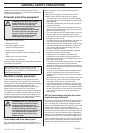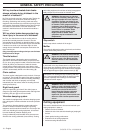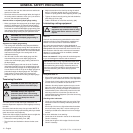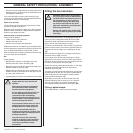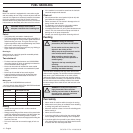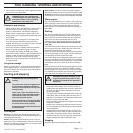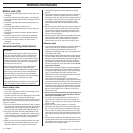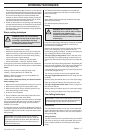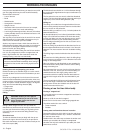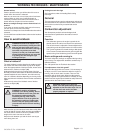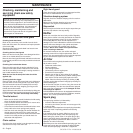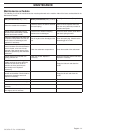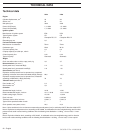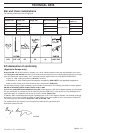
WORKING TECHNIQUES
16 – English
5451676-47 Rev. 4 2008-08-08
Before use: (33)
1 Check that the chain brake works correctly and is not
damaged.
2 Check that the rear right hand guard is not damaged.
3 Check that the throttle lockout works correctly and is not
damaged.
4 Check that the stop switch works correctly and is not
damaged.
5 Check that all handles are free from oil.
6 Check that the anti vibration system works and is not
damaged.
7 Check that the muffler is securely attached and not
damaged.
8 Check that all parts of the chain saw are tightened
correctly and that they are not damaged or missing.
9 Check that the chain catcher is in place and not
damaged.
10Check the chain tension.
General working instructions
Basic safety rules
1 Look around you:
• To ensure that people, animals or other things cannot
affect your control of the machine.
• To make sure that none of the above might come within
reach of your saw or be injured by falling trees.
CAUTION! Follow the instructions above, but do not use a
chain saw in a situation where you cannot call for help in
case of an accident.
2 Do not use the machine in bad weather, such as dense
fog, heavy rain, strong wind, intense cold, etc. Working
in bad weather is tiring and often brings added risks,
such as icy ground, unpredictable felling direction, etc.
3 Take great care when removing small branches and
avoid cutting bushes (i.e. cutting many small branches
at the same time). Small branches can be grabbed by
the chain and thrown back at you, causing serious
injury.
4 Make sure you can move and stand safely. Check the
area around you for possible obstacles (roots, rocks,
branches, ditches, etc.) in case you have to move
suddenly. Take great care when working on sloping
ground.
5 Take great care when cutting a tree that is in tension. A
tree that is in tension may spring back to its normal
position before or after being cut. If you position yourself
incorrectly or make the cut in the wrong place the tree
may hit you or the machine and cause you to lose
control. Both situations can cause serious personal
injury.
6 Before moving your chain saw switch off the engine and
lock the chain using the chain brake. Carry the chain
saw with the bar and chain pointing backwards. Fit a
guard to the bar before transporting the chain saw or
carrying it for any distance.
7 When you put the chain saw on the ground, lock the saw
chain using the chain brake and ensure you have a
constant view of the machine. Switch the engine off
before leaving your chain saw for any length of time.
General rules
1 If you understand what kickback is and how it happens
then you can reduce or eliminate the element of
surprise. By being prepared you reduce the risk.
Kickback is usually quite mild, but it can sometimes be
very sudden and violent.
2 Always hold the chain saw firmly with your right hand on
the rear handle and your left hand on the front handle.
Wrap your fingers and thumbs around the handles. You
should use this grip whether you are right-handed or
left-handed. This grip minimises the effect of kickback
and lets you keep the chain saw under control.
Do not
let go of the handles!
3 Most kickback accidents happen during limbing. Make
sure you are standing firmly and that there is nothing in
the way that might make you trip or lose your balance.
Lack of concentration can lead to kickback if the
kickback zone of the bar accidentally touches a branch,
nearby tree or some other object.
Have control over the workpiece. If the pieces you
intend to cut are small and light, they can jam in the saw
chain and be thrown towards you. This is not necessarily
dangerous in itself, but you may be surprised and lose
control of the saw. Never saw stacked logs or branches
without first separating them. Only saw one log or one
piece at a time. Remove the cut pieces to keep your
working area safe.
4 Never use the chain saw above shoulder height and
try not to cut with the tip of the bar. Never use the
chain saw one-handed!
(34)
5 You must have a steady stance in order to have full
control over the chain saw. Never work standing on a
ladder, in a tree or where you do not have firm ground to
stand on.
(35)
6 Always use a fast cutting speed, i.e. full throttle.
7 Take great care when you cut with the top edge of the
bar, i.e. when cutting from the underside of the object.
This is known as cutting on the push stroke. The chain
tries to push the chain saw back towards the user. If the
saw chain is jamming, the saw may be pushed back at
you.
8 Unless the user resists this pushing force there is a risk
that the chain saw will move so far backwards that only
the kickback zone of the bar is in contact with the tree,
which will lead to a kickback.
(36)
IMPORTANT!
This section describes basic safety rules for using a
chain saw. This information is never a substitute for
professional skills and experience. If you get into a
situation where you feel unsafe, stop and seek expert
advice. Contact your chain saw dealer, service agent or
an experienced chain saw user. Do not attempt any
task that you feel unsure of!
Before using a chain saw you must understand the
effects of kickback and how to avoid them. See
instructions under the heading How to avoid kickback.
Before using a chain saw you must understand the
difference between cutting with the top and bottom
edges of the bar. See instructions under the headings
How to avoid kickback and Machine’s safety
equipment.
Wear personal protective equipment. See instructions
under the heading Personal protective equipment.



